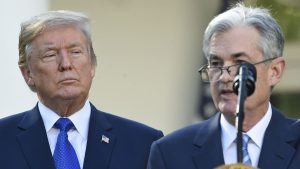Taxes and tariffs undo the wealth of nations – Daily Business Magazine


Uncertainty over the cost of doing business undermines the desire to take a risk and innovate, writes KEITH ANDERSON
In business, and in life generally, we have to deal with periods of uncertainty and unpredictability. However, today even the most resilient and phlegmatic businessperson would be forgiven for thinking enough is enough.
Even more so than ever, the ability to cope with the unexpected and, better still, react to it positively will determine which businesses thrive or survive.
Into the current, and continuing, geopolitical uncertainty, US President Donald Trump dropped his tariffs announcement (although this had been predicted).
Benjamin Franklin, one of the Founding Fathers of the United States, once declared that “no nation was ever ruined by trade” so we know what he would have made of the so called “Liberation Day”.
And, of course, it was the imposition by Britain of duties on tea imports that tipped the American colonists over the edge, or more precisely caused them to tip chests of tea into the harbour at Boston, at what famously became known as the Boston Tea Party.
Closer to home, Adam Smith was no fan of tariffs either, believing amongst other things that they subsidised domestic manufacturers and distorted investment; and all of this we knew as long ago as 1776, the year in which the US Declaration of Independence was made and, interestingly, Smith’s Wealth of Nations was published.
If a more recent endorsement of these views is required then look no further than the compelling critique of the adverse impact of tariffs by a modern champion of free trade, the former US President, Ronald Reagan, which has resurfaced on various media channels recently.
A partial suspension of the tariffs policy has provided some breathing space and must wait and see what happens next. Perhaps a few adverse polls wil have some influence on the US administration’s thinking.
Sticking with Adam Smith and reflecting upon what is happening in the UK and Scotland, what would the great economic thinker make of both governments’ attempts to encourage economic growth?
He reflected, prosaically to our 21st century ears, that “it is not from the benevolence of the butcher, the brewer or the baker that we expect our dinner, but from their regard for their own interest”.
So, even today, in the more sympathetic and supportive environment in which we willingly operate, there has to be a recognition that business people need to be incentivised if they are to take the risks and innovate to achieve the economic growth from which all can benefit.
For many years, economic growth in the UK, and specifically Scotland, has been woeful and policies to attract investment, growth and jobs are long overdue.
This makes the increases to employers’ national insurance contributions, increased rates of capital gains tax (and for SMEs the erosion of the benefits of Business Assets Disposal Relief), along with the proposed changes to Business Property Relief (BPR) in the context of inheritance tax, all seem counter intuitive.
We know what the farmers make of the proposed changes to BPR but, of course, these will impact all family-owned businesses of which there are many in Scotland and throughout the rest of the UK.
A less publicised impact of the proposed changes to BPR is to the Enterprise Investment Scheme and the Seed EIS. These schemes have been extremely effective in encouraging investment by individuals in start-up and early-stage companies for which there are few, if any, institutional investor alternatives.
That being the case, and at a time when we need to encourage investment in new businesses and ideas to drive job creation, develop new technologies and grow long-term tax revenues, there seems little sense in making investments using these schemes liable to inheritance tax; especially when such share holdings are usually illiquid, meaning that on the death of an investor the resultant tax bill would need to be funded from another source.
And, of course, this is a real issue as it is mainly older people who tend to invest through these schemes, and who should be encouraged to do so, in order that their capital can be put to good use for the wider economy now and in the future.
The ‘greed is good’ mantra of the late 20th century was never attractive and is largely discredited. Few would want to embrace that to the detriment of all citizens, but if we want the best public services, we need the tax revenues which flow directly or indirectly from wealth creators and, like it or not, that means that some will be wealthier than others, but does that really matter if collectively we are all better off as a result?
After all, to quote Adam Smith again, “the real problem of poverty is not a problem of distribution but of production”.
Keith Anderson is founder and chief executive of Vialex
>Latest Daily Business news
Related
#Taxes #tariffs #undo #wealth #nations #Daily #Business #Magazine





